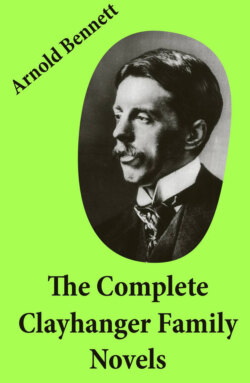Читать книгу The Complete Clayhanger Family Novels (Clayhanger + Hilda Lessways + These Twain + The Roll Call) - Arnold Bennett - Страница 172
На сайте Литреса книга снята с продажи.
Three.
Оглавление“Well?” Darius growled impatiently, even savagely. They saw each other, not once a week, but at nearly every hour of every day, and they were surfeited of the companionship.
“Supposing I wanted to get married?” This sentence shot out of Edwin’s mouth like a bolt. And as it flew, he blushed very red. In the privacy of his mind he was horribly swearing.
“So that’s it, is it?” Darius growled again. And he leaned forward and picked up the poker, not as a menace, but because he too was nervous. As an opposer of his son he had never had quite the same confidence in himself since Edwin’s historic fury at being suspected of theft, though apparently their relations had resumed the old basis of bullying and submission.
“Well—” Edwin hesitated. He thought, “After all, people do get married. It won’t be a crime.”
“Who’st been running after?” Darius demanded inimically. Instead of being softened by this rumour of love, by this hint that his son had been passing through wondrous secret hours, he instinctively and without any reason hardened himself and transformed the news into an offence. He felt no sympathy, and it did not occur to him to recall that he too had once thought of marrying. He was a man whom life had brutalised about half a century earlier.
“I was only thinking,” said Edwin clumsily—the fool had not sense enough even to sit down—“I was only thinking, suppose I did want to get married.”
“Who’st been running after?”
“Well, I can’t rightly say there’s anything—what you may call settled. In fact, nothing was to be said about it at all at present. But it’s Miss Lessways, father—Hilda Lessways, you know.”
“Her as came in the shop the other day?”
“Yes.”
“How long’s this been going on?”
Edwin thought of what Hilda had said. “Oh! Over a year.” He could not possibly have said “four days.” “Mind you this is strictly q.t! Nobody knows a word about it, nobody! But of course I thought I’d better tell you. You’ll say nothing.” He tried wistfully to appeal as one loyal man to another. But he failed. There was no ray of response on his father’s gloomy features, and he slipped back insensibly into the boy whose right to an individual existence had never been formally admitted.
Something base in him—something of that baseness which occasionally actuates the oppressed—made him add: “She’s got an income of her own. Her father left money.” He conceived that this would placate Darius.
“I know all about her father,” Darius sneered, with a short laugh. “And her father’s father! ... Well, lad, ye’ll go your own road.” He appeared to have no further interest in the affair. Edwin was not surprised, for Darius was seemingly never interested in anything except his business; but he thought how strange, how nigh to the incredible, the old man’s demeanour was.
“But about money, I was thinking,” he said, uneasily shifting his pose.
“What about money?”
“Well,” said Edwin, endeavouring, and failing, to find courage to put a little sharpness into his tone, “I couldn’t marry on seventeen-and-six a week, could I?”
At the age of twenty-five, at the end of nine years’ experience in the management and the accountancy of a general printing and stationery business, Edwin was receiving seventeen shillings and sixpence for a sixty-five-hour week’s work, the explanation being that on his father’s death the whole enterprise would be his, and that all money saved was saved for him. Out of this sum he had to pay ten shillings a week to Maggie towards the cost of board and lodging, so that three half-crowns remained for his person and his soul. Thus he could expect no independence of any kind until his father’s death, and he had a direct and powerful interest in his father’s death. Moreover, all his future, and all unpaid reward of his labours in the past, hung hazardous on his father’s goodwill. If he quarrelled with him, he might lose everything. Edwin was one of a few odd-minded persons who did not regard this arrangement as perfectly just, proper, and in accordance with sound precedent. But he was helpless. His father would tell him, and did tell him, that he had fought no struggles, suffered no hardship, had no responsibility, and that he was simply coddled from head to foot in cotton-wool.
“I say you must go your own road,” said his father.
“But at this rate I should never be able to marry!”
“Do you reckon,” asked Darius, with mild cold scorn, “as you getting married will make your services worth one penny more to my business?” And he waited an answer with the august calm of one who is aware that he is unanswerable. But he might with equal propriety have tied his son’s hands behind him and then diverted himself by punching his head.
“I do all I can,” said Edwin meekly.
“And what about getting orders?” Darius questioned grimly. “Didn’t I offer you two and a half per cent on all new customers you got yourself? And how many have you got? Not one. I give you a chance to make extra money and you don’t take it. Ye’d sooner go running about after girls.”
This was a particular grievance of the father against the son: that the son brought no grist to the mill in the shape of new orders.
“But how can I get orders?” Edwin protested.
“How did I get ’em? How do I get ’em? Somebody has to get ’em.” The old man’s lips were pressed together, and he waved “The Christian News” slightly in his left hand.
